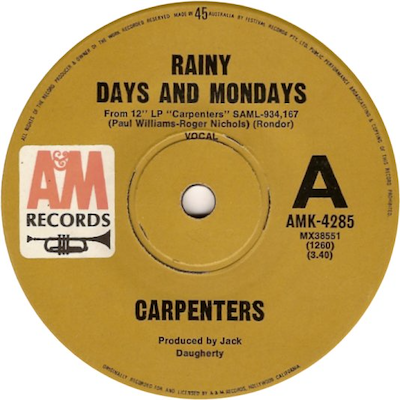Until a few years ago, I thought of The Carpenters as part of that. It’s one of the reasons why it’s in here. It was very much part of my childhood, because one of the things about only having six records is that you get to know them quite well, and The Carpenters were alway on the radio and TV. A few times in my life I’ve just rejected everything that came before and I very much did that with my parents’ music. It wasn’t really until I met Brett, who was interested in 60s music, Pink Floyd, The Doors and things like that, that I went back and actually listened to any of that.
I go back to this record by The Carpenters a lot because she has the most incredible voice, one of the great white soul voices. Knowing her history and what she was going through at the time, I find her such a sympathetic figure. She was trapped in this rock and roll world and didn’t want to be; she wanted to be a housewife, she wanted to have kids and live an ordinary life. She was almost cursed with this incredible talent, a voice that expresses hidden pain better than most soul singers. There’s always something tragic hidden in their songs, that British thing of trying to get through it but you’re hearing the sadness in the cracks in the voice. I listen to those records now and I think they’re really beautiful. They’re very sad, but they’re not trying to be, it’s not a Nick Cave thing where you’re trying to express grief and sadness, they’re trying to be pop records and this sadness shows through. I still listen to ‘Rainy Days And Mondays’ and think it’s a beautiful, beautiful song.



